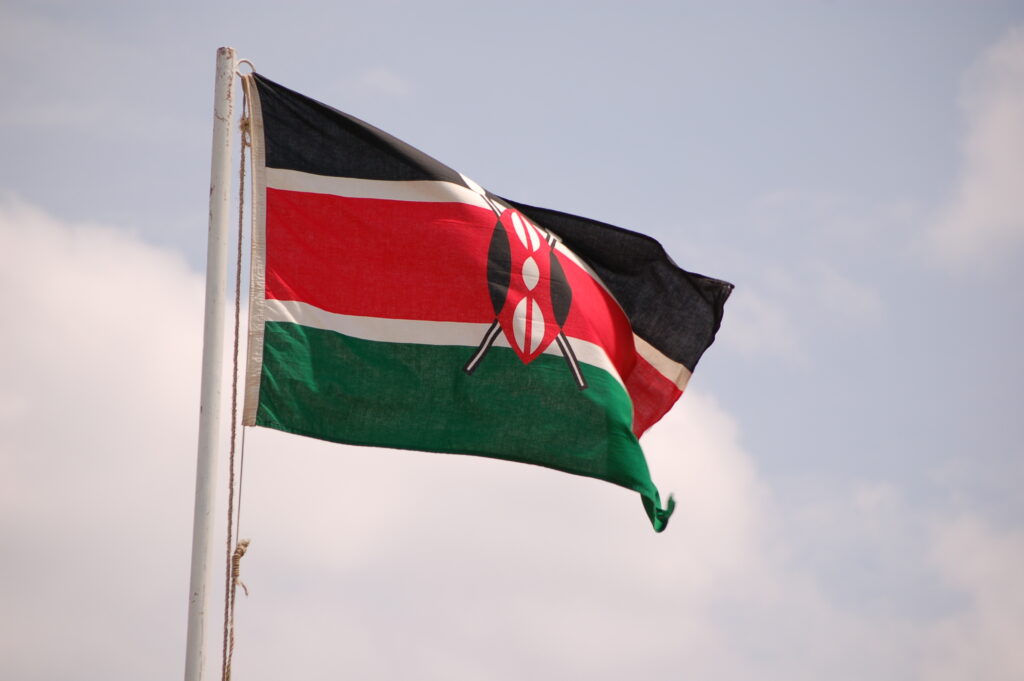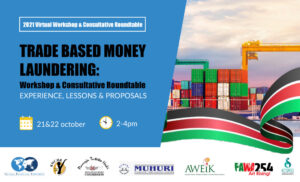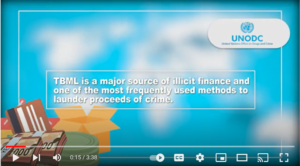
Kenya
In Kenya, Global Financial Integrity (GFI) works with local partners to advocate for a more transparent and robust financial and trade system. GFI produces research and programs specific to how illicit financial flows, corruption and other key issues affect local communities in Kenya. An important aspect of this effort is a focus on anti-corruption and transparency measures such as beneficial ownership.
Policy Advocacy:
Following The Business Registration service of Kenya’s (BRS) call, GFI submitted and presented comments on The Companies (Beneficial Ownership Information) (Amendment) Regulations, 2021 dated 8th December 2021. GFI recommends measures that address the transparency and BO of legal persons and recommendations that countries should adopt to achieve accountability.
Factsheets:
GFI has partnered with Transparency International Kenya to produce a series of informational pamphlets. These factsheets examine Beneficial Ownership and IFFs in Kenya. The first provides a Q&A on the Beneficial Ownership Law in Kenya. The second looks at the nexus between illicit financial flows (IFFs) and issue areas that are not always thought of as having an immediate connection to money laundering and corruption, including environmental justice and gender equality in Kenya. These pamphlets also explore the more commonly discussed cross of IFFs and beneficial ownership and trade misinvoicing.
This pamphlet employs a series of context-specific case examples that demonstrate these connections and identify key areas for policy improvement. Using this innovative approach, the pamphlet is geared towards the needs of key stakeholders in Kenya and provides the requisite evidence base to advocate for the use of financial transparency and anti-money laundering tools such as beneficial ownership as ways to tackle the negative impacts of illicit financial flows. The pamphlets are available in English and Kiswahili.
Download the PDFs here:
- Q&A About Kenya’s Beneficial Ownership Law
- Illicit Financial Flows in Kenya
- Uhamishaji Wa Fedha Haramu Nchini Kenya
- Compliance and Gaps in Beneficial Ownership in the Mining Sector in Kenya.
- Beneficial Ownership Transparency in Kenya 2024
Events:
Webinars:
Trade Based Money Laundering: Workshop and Consultative Roundtable
21&22 October, 2021
GFI hosted a two-day virtual workshop & consultative roundtable on Trade-Based Money Laundering (TBML) for Civil Society Organizations in Kenya. The training’s main objective was to shine a light on how TBML affects a country’s economy and day-to-day livelihoods.
How are IFFs affecting communities in Kenya?
17 March, 2021
GFI hosted a panel discussion on the nexus between Illicit Financial Flows & Beneficial Ownership Transparency in Kenya. This event focused on the Factsheet produced by GFI titled “Illicit Financial Flows in Kenya” which explored environmental justice, gender equality, beneficial ownership and trade misinvoicing in relation to IFFs.
Videos
Beneficial Ownership and Financial Transparency in Kenya
In 2020, 384.3 billion shillings (US$3.5 billion) was laundered through the Kenyan economy. Why is beneficial ownership transparency important for Kenya? It is key to combatting tax evasion, corruption, money laundering, shell companies and terrorism financing in Kenya.
Illicit Financial Flows in Kenya
How are Illicit Financial Flows affecting communities in Kenya?
Every year Kenya loses billions of shillings through illicit financial flows (IFFs) driven by corruption, trade misinvoicing and tax evasion. This deprives the country of much needed revenue, stifling and dwarfing development in Kenya.
Trade Based Money Laundering Kenya
Radio Programmes:
At the end of 2020, GFI organized a series of Swahili radio shows with support from the Norwegian Agency for Development Cooperation (NORAD). These shows were aimed at building community knowledge and understanding of illicit financial flows (IFFS) and the connections to corruption and beneficial ownership. These shows were broadcast during prime time on popular radio station Kaya FM on a programme called “Fataki ya Ukweli.”
GFI Hosts Radio Show on Illicit Financial Flows
25 October, 2020
The first show of the series took place October 25 at 4:30pm and featured GFI Africa Policy and Outreach Coordinator Francis Kairu, Kwale County chief officer Mr Juma Nzao and Ethics and AntiCorruption Commission (EACC) Assistant Director Philip Kagucia.
This show covered the following topics:
- Financial and economic crime and the relations to illicit financial flows
- Drivers of IFFs e.g. corruption, Money laundering, wildlife trafficking & tax evasion
- Different roles county government, civil society, and enforcement institutions can play to reduce IFFs
- Links between IFFs and service delivery, especially at county level
- Enforcement measures under several laws such as the Anticorruption and Economic Crimes Act and the Proceeds of Crime and Anti-Money Laundering Act.
- Case studies in Kwale e.g. on natural resources (Titanium, Niobium etc.)
Radio show on Beneficial ownership in Kenya
22 November, 2020
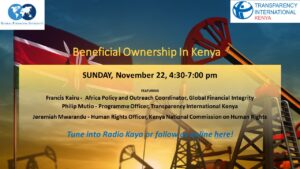
The second show was held on November 22 at 4:30pm to discuss Beneficial Ownership in Kenya. Panelists included GFI’s Francis Kairu, the Kenya National Commission on Human Rights (KNCHR) Regional Services Officer and Lawyer Jeremiah Mwarandu, and Transparency International Kenya (TI-K) Programmes Officer Philip Mutio.
This radio show addressed the following topics:
- What is beneficial ownership?
- The importance of beneficial ownership for the country/county/ordinary citizens
- How is beneficial ownership related to corruption?
- How is beneficial ownership related to human rights?
- New laws regarding beneficial ownership in Kenya
- What is the beneficial ownership registry?
- Case studies on beneficial ownership in Kenya
How Illicit Financial Flows Affect Communities in Kwale
6 December, 2020
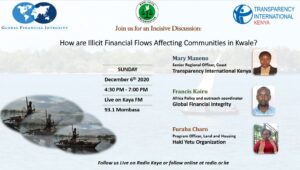
The third show was organized with Transparency International Kenya (TI-K) and Haki Yetu on December 6 at 4:30pm to highlight the effects IFFs have on local communities. Francis Kairu was joined by the Senior Regional Officer for TI-K Mary Maneno, and the Programs Officer for Lands and Housing for Haki Yetu, Furaha Charo.
The show addressed the following areas:
- How different communities within Kwale have been impacted by IFFs from their own perspective
- The gender impacts of IFFs
- How policies could be made responsive to the needs of communities
- Recommended changes that can be transformed into policy demands.
- Real community clusters affected by IFF’s e.g. women/minority communities/fishermen etc.

